To deepen your faith and understanding, check out five remarkable Christian theology books. Start with *Systematic Theology* by Wayne Grudem for a structured overview of key doctrines. Next, *Mere Christianity* by C.S. Lewis offers accessible insights into morality and faith. *What Every Christian Should Know* simplifies essential beliefs for all stages. Then, *Christian Theology* serves as a foundational resource for serious study. Finally, *Concise Theology* by J.I. Packer provides short, digestible studies on historic beliefs. Each book can greatly enrich your spiritual journey, and there's much more to explore for further growth.
Systematic Theology, Second Edition: An Introduction to Biblical Doctrine
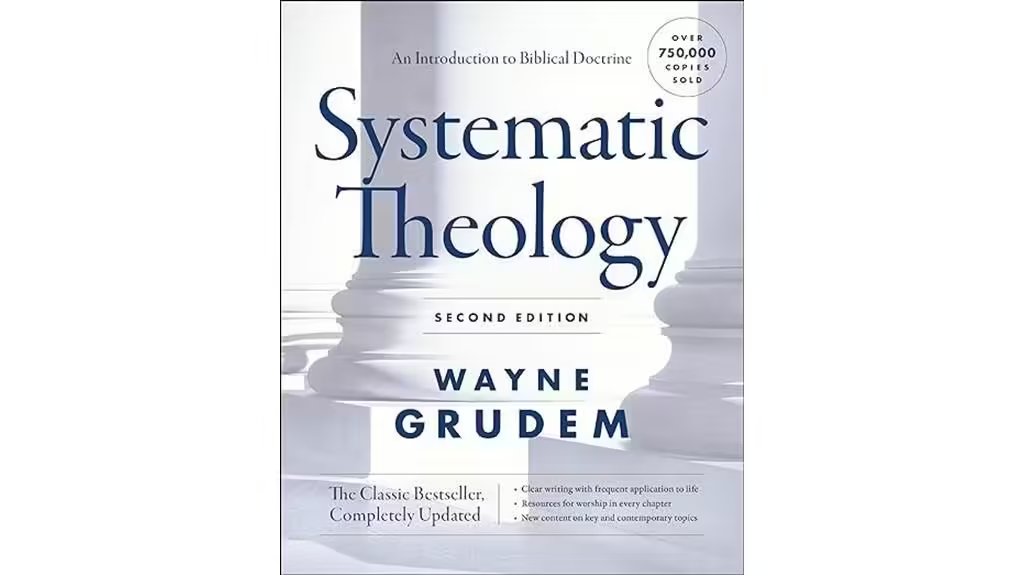
If you're a student of theology or just someone enthusiastic to deepen your understanding of Christian doctrine, "Systematic Theology, Second Edition: An Introduction to Biblical Doctrine" by Wayne Grudem is an excellent choice. This book offers a well-structured overview of key biblical doctrines, covering everything from the nature of God to salvation. I appreciate how Grudem balances academic rigor with practical application, making complex concepts accessible. Each chapter includes reflective questions and suggestions for further reading, which really helped me engage with the material. Many readers, including myself, have found it beneficial for personal study and stimulating discussions on theology. Overall, Grudem's work has been instrumental in enhancing my understanding and spiritual growth.
Best For: Students of theology and individuals seeking to deepen their understanding of Christian doctrine.
Pros:
- Accessible writing style makes complex theological concepts easy to understand for readers without formal training.
- Balanced approach combines academic rigor with practical application, fostering both intellectual challenge and spiritual growth.
- Engaging reflective questions and further reading suggestions enhance the learning experience and encourage discussion.
Cons:
- Some readers find the content less engaging compared to more literary theological works.
- While detailed, the systematic structure may feel overwhelming for those new to theology.
- Similarities to the first edition might lead to a sense of repetition for returning readers.
Mere Christianity
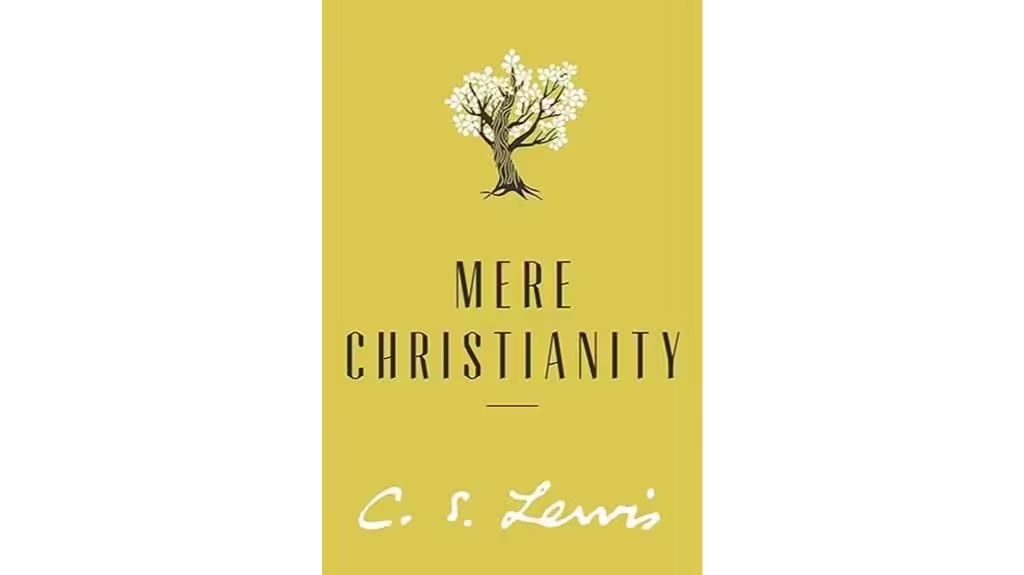
"Mere Christianity" is a must-read for anyone seeking to understand the core principles of Christianity, whether you're a believer or simply curious about the faith. C. S. Lewis, once an atheist, offers a compelling perspective that invites reflection on moral truths and the essence of human nature. His conversational style, rooted in informal radio broadcasts, makes complex ideas accessible. Lewis discusses the Law of Human Nature, emphasizing the importance of morality for societal harmony. He categorizes virtues and warns against pride as a significant vice. The book's timeless insights resonate with readers, encouraging us to examine our moral responsibilities and choices. I highly recommend it for anyone wanting to deepen their understanding of Christian beliefs and their implications in daily life.
Best For: Individuals seeking a deeper understanding of Christian beliefs, regardless of their current faith or background.
Pros:
- Clear and accessible writing style makes complex theological concepts easy to grasp.
- Timeless insights into morality and human nature encourage self-reflection and personal growth.
- Appeals to a broad audience, including both believers and skeptics, fostering meaningful discussions.
Cons:
- Some readers may find the arguments too simplistic or lacking in academic depth.
- The focus on Christian doctrine may not resonate with those from non-Christian backgrounds.
- The conversational tone might not suit readers looking for a more formal theological analysis.
What Every Christian Should Know: 10 Core Beliefs for Standing Strong
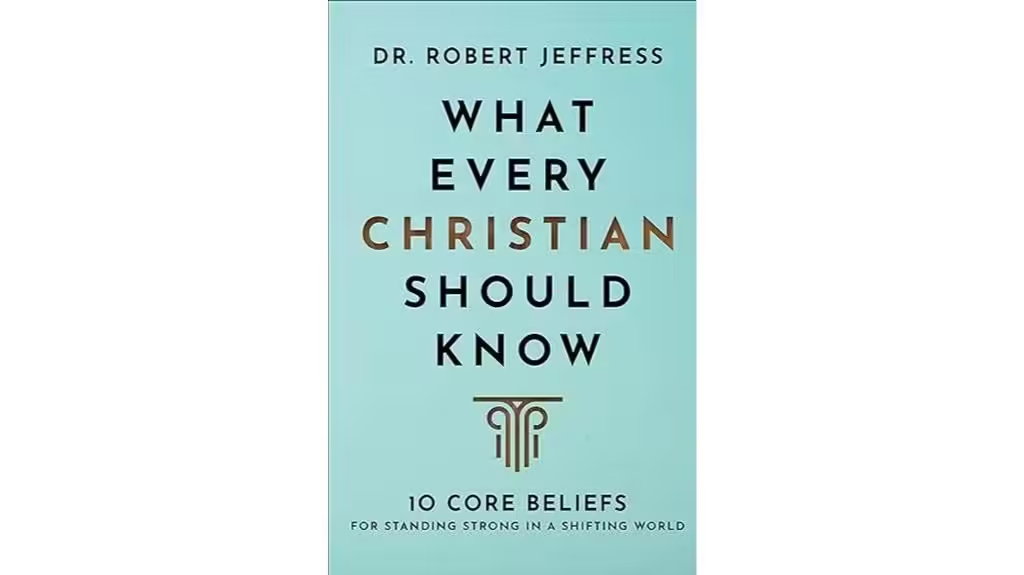
For anyone seeking to deepen their understanding of Christian beliefs, "What Every Christian Should Know: 10 Core Beliefs for Standing Strong" stands out as an accessible resource. This book is perfect for believers at any stage, presenting systematic theology in a way that's easy to grasp. I found the author's voice engaging, as it felt like a conversation directly with me. While some readers felt their attention waned at times, I appreciated the clear explanations of core beliefs. It's also great for small group discussions or simply revitalizing my knowledge. Plus, I received my copy in excellent condition, which added to the overall positive experience. I'd highly recommend this book to anyone wanting to strengthen their faith.
Best For: Anyone seeking to deepen their understanding of Christian beliefs, regardless of their current stage in faith.
Pros:
- Clear and accessible explanations of core Christian beliefs.
- Engaging writing style that feels conversational and personal.
- Ideal for small group discussions and refreshing existing knowledge.
Cons:
- Some readers may find it lengthy and struggle to maintain attention.
- Mixed reactions on engagement, with a few feeling it could be more captivating.
- May not provide in-depth analysis for those seeking advanced theological insights.
Christian Theology
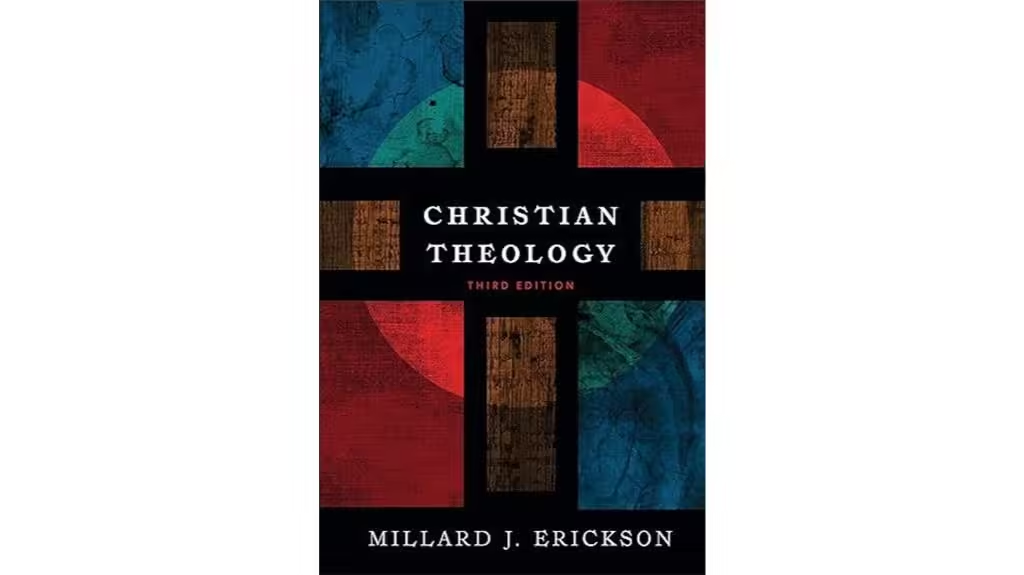
Christian theology books stand out as essential resources for seminary students and serious theology enthusiasts. I've found them to be highly informative and well-structured, making them perfect for those committed to deep study. If you're looking to immerse yourself in complex topics, these books are invaluable. They cover major theological issues, prominent theories, and key debates while grounding conclusions in Scripture and church history. However, be prepared; the terminology can be challenging, so I recommend having a companion book handy. These texts are best suited for serious scholars rather than casual readers. Investing time and money in them is worth it, especially if you're keen to expand your vocabulary and knowledge in Christian theology.
Best For: Serious students of theology and seminary students looking for an in-depth understanding of Christian theology.
Pros:
- Highly informative and well-structured, making complex topics approachable for dedicated learners.
- Covers a wide range of theological issues and includes conclusions based on Scripture and historical context.
- Engaging for those who enjoy expanding their vocabulary and knowledge, useful for sermon research and writing.
Cons:
- Not suitable for casual readers or those new to the study of theology due to complex terminology.
- Some copies may arrive slightly damaged despite quick delivery.
- Requires a significant investment of time and money, which may be a barrier for some.
Concise Theology: A Guide to Historic Christian Beliefs
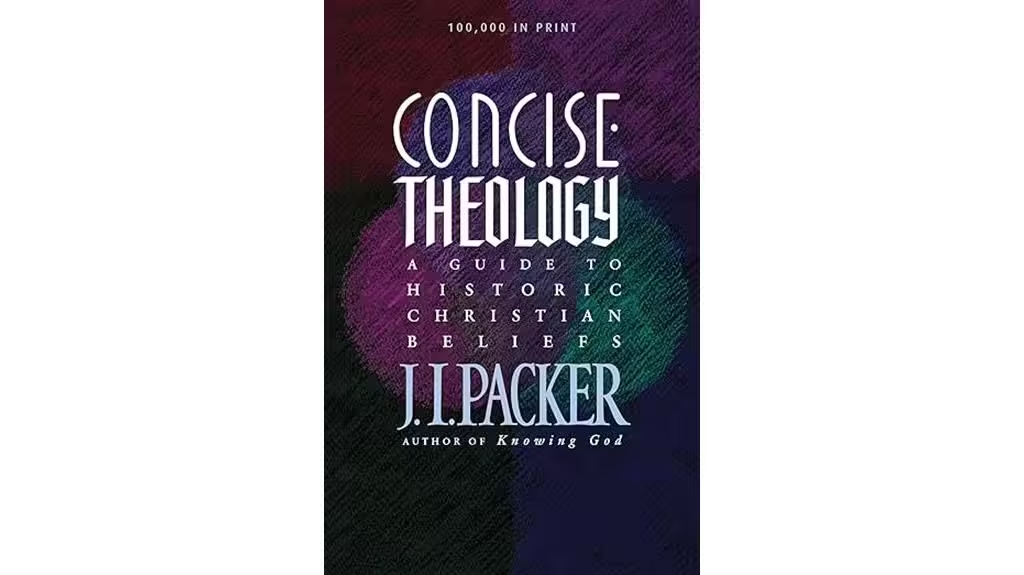
If you're looking for a straightforward introduction to core Christian beliefs, "Concise Theology: A Guide to Historic Christian Beliefs" by J.I. Packer is a perfect choice. This book provides 95 short studies on essential theological topics, covering everything from revelation to salvation. Each chapter is concise, making it easy to read and reflect on key doctrines. Packer organizes the content into four main sections, ensuring a clear structure that encourages further exploration. His devotional writing style emphasizes worship, inviting readers to deepen their faith. While it doesn't tackle every nuance of Reformed theology, it's an accessible resource for both personal study and group discussions. I highly recommend it for anyone wanting to enhance their understanding of Christian doctrine.
Best For: Those seeking a concise and accessible introduction to core Christian beliefs and doctrines.
Pros:
- Clear and structured organization of essential theological topics.
- Devotional writing style that encourages worship and deeper faith.
- Ideal for both personal study and group discussions.
Cons:
- Does not cover every nuance of Reformed theology.
- Limited references to other theological literature.
- Some recent editions have reported concerns about print quality.
Factors to Consider When Choosing Christian Theology Books
When choosing Christian theology books, consider who your target audience is and what their needs are. You'll also want to think about the writing style, as it can greatly affect understanding and engagement. Balancing depth with accessibility is key, along with identifying specific themes that resonate with your interests or goals.
Target Audience Considerations
Choosing the right Christian theology book hinges on understanding who it's for. Recognizing your target audience is essential, as some books are crafted for seminary students with complex terminology, while others aim at lay readers looking for accessible explanations. Think about your own level of theological knowledge; if you're a beginner, introductory texts will serve you better, whereas advanced works will cater to those already grounded in theology.
You should also consider whether you're reading alone or in a group. Some books are explicitly designed for small group studies, making them perfect for believers wanting to engage in discussions about faith together. Assess the writing style and approach; books that speak directly to the reader can enhance your engagement and understanding, especially if you're new to theological concepts.
Lastly, don't underestimate the value of recommendations from trusted sources. They can guide you toward texts that align with your spiritual maturity and interest in deepening your understanding of Christian doctrine. By taking these factors into account, you can choose a theology book that resonates with you and enriches your faith journey.
Writing Style Matters
Writing style plays an essential role in how effectively a theology book communicates its message. When you choose a theology book, consider how the author's writing style affects your understanding. A conversational tone can engage you more than dense academic language, making complex concepts feel more approachable. Authors who write as if they're speaking directly to you often create a relatable atmosphere, inviting you to explore theological ideas with curiosity.
Clarity and simplicity are crucial. If the writing is straightforward, you're more likely to grasp intricate ideas, whether you're a layperson or a serious student. Devotional and practical writing styles not only help you understand theological truths but also encourage you to engage in worship and reflection.
It's also important to find a balance between academic rigor and readability. Some readers may be put off by overly complex terminology, while others might seek depth and scholarly insights. Knowing your preferences can guide you in selecting a book that resonates with your desire for both understanding and spiritual growth. Ultimately, the right writing style can greatly enhance your theological journey.
Depth vs. Accessibility
Maneuvering the landscape of Christian theology books requires a thoughtful consideration of depth versus accessibility. When you're choosing a book, think about your current understanding of theology. If you're a serious student or have a strong interest in theology, you might prefer texts that dive deep into complex terminology and detailed discussions. These scholarly works can enrich your knowledge, but they often require significant time investment and prior knowledge.
On the other hand, if you're just starting or looking for something more approachable, opt for accessible books. Authors like C. S. Lewis and J.I. Packer excel at presenting profound theological ideas in a relatable manner, making complex topics digestible for lay readers. Accessible texts introduce core beliefs clearly, which can be perfect for beginners or casual readers.
Remember that the balance between depth and accessibility can impact your engagement. While some appreciate a detailed exploration of theological concepts, others might find those texts overwhelming. Ultimately, your choice should align with your goals—whether you seek intricate theories or foundational knowledge for spiritual growth. Consider what suits you best, and you'll find the right theology book to deepen your faith.
Thematic Focus Areas
When exploring Christian theology books, the thematic focus areas play a significant role in your selection process. Consider themes like the nature of God, salvation, and morality, as these topics are vital to Christian doctrine and practice. Look for books that balance academic rigor with practical application, ensuring they connect theological concepts to your daily life.
Evaluate the writing style and accessibility of the book. Some might be more suitable for those without formal theological training, while others cater to advanced students. This consideration is important for grasping the material effectively.
Additionally, think about whether the book aims to unify various Christian denominations or focuses on specific theological traditions. This choice can profoundly impact your understanding of different perspectives within Christianity.
Recommended Use Cases
Choosing the right Christian theology book involves considering several factors that align with your specific needs and goals. If you're looking for a structured academic study, systematic theology books are ideal. They offer thorough coverage of biblical doctrines and encourage a deep exploration of theological concepts. For those in various stages of faith, accessible primers can serve as excellent resources, perfect for personal growth or small group discussions.
If you want to clarify your beliefs, consider engaging with books that present logical arguments for Christianity. These can help both believers and skeptics understand fundamental principles and moral responsibilities. Conversely, if you need quick reference materials for group studies, concise theological guides provide focused discussions on key doctrines without overwhelming you.
For serious theological students, select more scholarly texts that cater to in-depth research. These works often explore complex terminology and extensive historical context, making them suitable for those committed to a deeper understanding of theology. By reflecting on these factors, you'll find the right resources to deepen your faith and understanding effectively.
Frequently Asked Questions
What Are the Benefits of Reading Theology Books?
Reading theology books offers you a deeper understanding of spiritual concepts and beliefs. They help you explore different interpretations of scripture, enhancing your faith journey. You'll find clarity on complex theological issues and gain insights that challenge your thinking. Engaging with these texts fosters personal growth and encourages meaningful discussions with others. Ultimately, diving into theology can strengthen your beliefs, enrich your worldview, and deepen your connection to your faith.
How Do I Choose the Right Theology Book for Me?
Choosing the right theology book for you starts with identifying your interests and questions. Think about what aspects of theology resonate with you—whether it's historical context, doctrinal debates, or personal faith applications. Look for recommendations from trusted sources, like friends or mentors, and consider reading reviews to gauge if a book aligns with your needs. Don't hesitate to explore different authors and styles until you find one that speaks to you.
Are There Theology Books for Beginners?
There are tons of theology books for beginners that'll blow your mind. You'll find titles that cover the basics and introduce key concepts in an engaging way. Look for authors who write clearly and connect with your interests. Start with books that explain fundamental beliefs or offer an overview of Christian history. As you read, you'll build a solid foundation and grow in understanding, making your journey through theology exciting and accessible.
Can Theology Books Help With Personal Spiritual Growth?
Absolutely, theology books can be a powerful tool for your personal spiritual growth. They challenge your beliefs, expand your understanding of faith, and offer new perspectives on scripture. When you engage with these texts, you're not just reading; you're reflecting and applying insights to your life. This process deepens your relationship with God and enhances your spiritual journey, making it more meaningful and enriching as you explore your faith.
Are There Audio Versions of Popular Theology Books Available?
Have you ever wished to plunge into theology while on the go? Yes, there are plenty of audio versions of popular theology books available! Many well-known titles have been adapted into audiobooks, making it easier for you to absorb profound concepts during your commute or workout. Platforms like Audible and even public libraries often carry these. So, grab your headphones and let the wisdom of theology enrich your journey wherever you are!
Wrapping Up
As you journey through these enriching books, think of each one as a stepping stone across a river of faith. Each title invites you to explore deeper waters, helping you build a sturdy bridge between knowledge and belief. Embrace the wisdom within their pages, and let them illuminate your path. Just as a lamp brightens a dark room, these texts can shine light on your understanding, guiding you closer to the heart of your faith.
